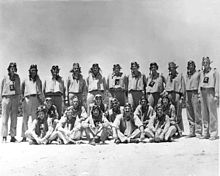

Albert William Tweedy, Jr.
Quick Facts

Biography
Albert William Tweedy, Jr., (March 22, 1920 – June 4, 1942) a United States Marine Corps aviator, was awarded the Navy Cross for his actions in the Battle of Midway during World War II. The USS Tweedy was named in his honor.
Early life
Albert Tweedy, Jr. was born on March 22, 1920. During his childhood, he attended public schools in Winnetka, Illinois, and Hingham, Massachusetts, before enrolling at Williams College, Williamstown, Massachusetts, in the fall of 1938.
Marine Corps career
In the summer of 1939, Tweedy completed Marine Corps' Platoon Commander School at Marine Corps Base Quantico, Virginia, and, at the end of his sophomore year, he left college to become a Marine Aviation Cadet. Following flight training at Naval Air Station Squantum, Massachusetts, and Naval Air Station Pensacola, Florida, he was commissioned as a second lieutenant in the United States Marine Corps Reserve on October 14, 1941. He was assigned to the 2nd Marine Aircraft Wing, Fleet Marine Force, stationed at Marine Corps Air Station Miramar in San Diego, California, and Marine Corps Air Station Ewa, Hawaii. In early 1942, he reported for duty with Marine Scouter-Bomber Squadron VMSB-241 at Midway Island. He served as Assistant Flight Officer and Assistant Communications Officer for the squadron before becoming its Communications Officer late in May.

Early on the morning of June 4, 1942, Tweedy took off from Midway Atoll in his Douglas SBD-2 "Dauntless" dive-bomber. Shortly afterwards, Japanese carrier-borne aircraft attacked the Marine installations on Midway, marking the start of the Battle of Midway. The outdated American fighters based on the island as part of its defense were quickly overwhelmed by the newer and more nimble Japanese Zeros during the opening stages of the battle.
On that morning, Tweedy flew with Major Lofton Henderson's division of VMSB-241. Although stripped of its fighter protection, this division nonetheless attempted a glide-bombing attack on Japanese carrier Hiryu. Despite a heavy antiaircraft barrage and repeated attacks by the numerically superior enemy fighter planes, Tweedy dived his aircraft to a very low altitude before releasing a bomb over the enemy carrier. Japanese fighters then attacked him and shot him down, killing him in the process. For his actions, he was posthumously awarded the Navy Cross.
Namesake
A John C. Butler-class destroyer escort, was laid down at the Boston Navy Yard and renamed On August 31, 1943, as the USS Tweedy (DE-532), in his honor. Sponsored by his mother, the USS Tweedy (DE-532), was launched on October 7, 1943. Commanded by Lieutenant Commander Thomas Donald Cunningham, it was finally commissioned on February 12, 1944.
Navy Cross citation
Citation:
The President of the United States of America takes pride in presenting the Navy Cross (Posthumously) to Second Lieutenant Albert W. Tweedy, Jr. (MCSN: 0-7145), United States Marine Corps (Reserve), for extraordinary heroism and distinguished service in the line of his profession while serving as a Pilot in Marine Scout-Bombing Squadron TWO HUNDRED FORTY-ONE (VMSB-241), Marine Air Group TWENTY-TWO (MAG-22), Naval Air Station, Midway, during operations of the U.S. Naval and Marine Forces against the invading Japanese Fleet during the Battle of Midway on 4 June 1942. During the initial attack upon an enemy aircraft carrier, Second Lieutenant Tweedy, in the face of withering fire from Japanese fighter guns and anti-aircraft batteries, dived his plane to a perilously low altitude before releasing his bomb. Since he failed to return to his base and was missing in action, there can be no doubt, under conditions attendant to the Battle of Midway, that he gave his life in the defense of his country. His cool courage and conscientious devotion to duty were in keeping with the highest traditions of the United States Naval Service.